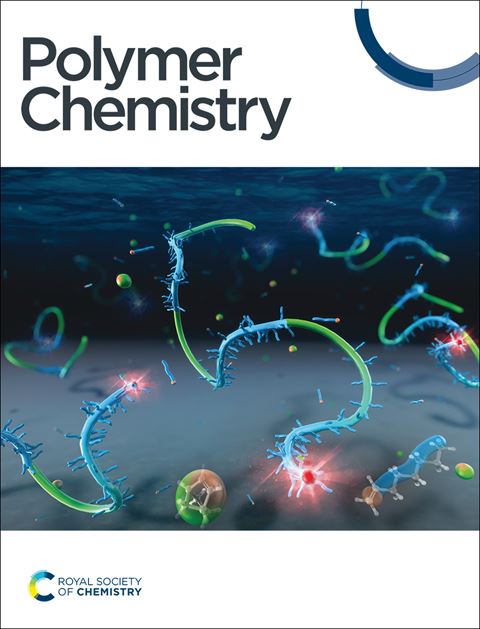Polymerization of isoprene and butadiene with unparalleled stereoselectivity catalysed by rare-earth metal cationic species bearing a novel tridentate ligand†
IF 3.9
2区 化学
Q2 POLYMER SCIENCE
引用次数: 0
Abstract
Rare-earth metal complexes bearing a novel tridentate ligand with a phenylthiol sidearm have been synthesized. The corresponding rare-earth metal cationic species, with the exception of the lutetium-based complex, showed unparalleled stereoselectivity in the polymerization of isoprene and butadiene to respectively produce cis-1,4-polyisoprene and trans-1,4-polybutadiene. The unusual reactivity ratio in the yttrium-catalyzed copolymerization of isoprene and butadiene (rIP = 2.61 and rBD = 0.57) suggested that the generated copolymer possessed a unique sequence distribution. The excellent livingness of the reactions enabled the yttrium-based catalytic system to produce isoprene-butadiene block copolymers, which could be completely hydrogenated to serve as thermoplastic elastomers. Stress–strain experiments and hysteresis testing revealed the pivotal role that the sequence length plays in determining the mechanical properties of the hydrogenated copolymers.

在含有新型三叉配体的稀土金属阳离子物种催化下,异戊二烯和丁二烯具有不平行立体选择性的聚合反应
除了以镥离子为中心的阳离子配合物外,其他相应的阳离子配合物在异戊二烯和丁二烯的聚合反应中显示出不平行的立体选择性,分别生成顺式-1,4-聚异戊二烯和反式-1,4-聚丁二烯。在钇催化的异戊二烯和丁二烯共聚过程中,反应活性比(rIP = 2.61 和 rBD = 0.57)不寻常,这表明生成的共聚物具有特殊的序列分布。出色的活化性使钇基催化系统能够生成异戊二烯-丁二烯嵌段共聚物,这些共聚物可以完全氢化,用作热塑性弹性体。应力应变实验和滞后测试表明,序列长度在决定氢化共聚物机械性能方面起着关键作用。
本文章由计算机程序翻译,如有差异,请以英文原文为准。
求助全文
约1分钟内获得全文
求助全文
来源期刊

Polymer Chemistry
POLYMER SCIENCE-
CiteScore
8.60
自引率
8.70%
发文量
535
审稿时长
1.7 months
期刊介绍:
Polymer Chemistry welcomes submissions in all areas of polymer science that have a strong focus on macromolecular chemistry. Manuscripts may cover a broad range of fields, yet no direct application focus is required.
 求助内容:
求助内容: 应助结果提醒方式:
应助结果提醒方式:


